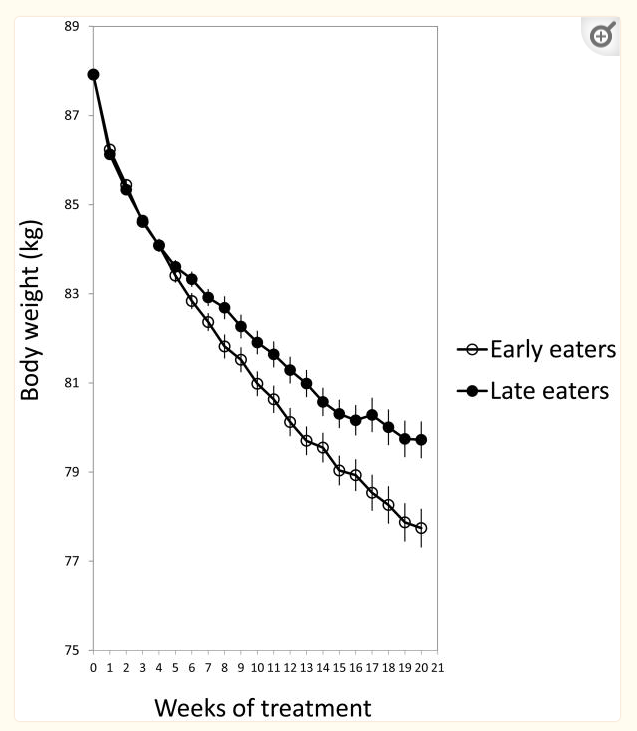Have you ever skipped meals all day just to binge at the end of the day in a calorie-dense haze? Even if you don’t eat an enormous amount of food in the evening, packing all or most of your calories into the latter part of the day is not good for your health. Keep reading to find out why, or click here to listen to the audio version of this article.

I know I’m not the only one.
Alright, let’s talk about meal timing.
When it comes to weight management, many people like to push the idea of calories in calories out. If you haven't come across it, it’s basically a succinct way of saying that if you want to lose weight or you want to maintain your current weight, you only need to worry about not eating more calories than you burn. To a certain extent this is true, but it doesn't tell the whole story of why all of us come in different shapes and sizes, even when we eat the same things.
Think about this – have you ever been in a situation where you and someone else that you know ate the same meals, but one of you was thinner than the other? This simple example tells us that how our bodies handle calories is not a static physiological feature. I’ll go more into calories in calories out in a different article, but keep that in mind as we discuss the actual focus of today – meal timing.
Research shows that our bodies digest food and store energy in a manner that is dependent on the time of day.
On St. Croix, where I’m from, lunch and dinner are normally the heaviest meals of the day. Depending on where you grew up, you may have become accustomed to all three meals being equally heavy, breakfast being the heaviest meal, or any variation in between.

A traditional Crucian breakfast of saltfish, herring, fritters, spinach, meat, and a boiled egg. Photo: Cruzan Foodie.
Meal timing and weight loss
Research on meal timing shows that for people for whom the heaviest meal of the day takes place after 3 pm, weight management is an especially tough battle. Even when researchers matched people for age, calorie intake, appetite hormone levels, sleep, and energy expenditure, the people who ate more of their calories later in the day were heavier than those in the comparison group.
Take a look at this graph.

Source: Garaulet et al 2013
What you are seeing is two treatment groups – those who had their heaviest meal of the day before 3 pm, the “early eaters,” denoted by the hollow circles, and those who had their heaviest meal after 3 pm, the “late eaters,” denoted by the black circles. This study included 420 middle-aged men and women who voluntarily took part in a weight loss program for 20 weeks. The researchers found that even though they were eating a similar number of calories, the amount of weight loss between groups differed by several pounds in favor of the “early eaters.”

If you needed another reason to stop indulging in Uber Eats at 12 am, here it is.
Other studies ( see this one and this one) on this topic have come to the same conclusion. Eating later in the day has also been tied to decreased resting energy expenditure, which is the amount of energy that you burn just to stay alive, aka your metabolic rate, and decreased glucose tolerance, which can be an early warning sign of type 2 diabetes.
Meal timing and the oral microbiome
When you have your meals also impacts the bacteria that live in your mouth. The gut microbiome is all the rage in nutrition research, but remember, your microbiome is not just in your colon; it’s on your skin, in your reproductive organs, and yes, in your mouth. These bacteria respond to what we feed them, and the time of day when we feed them.
Eating later in the day can increase the number of purported pro-inflammatory bacteria that live inside you, and this can have a negative effect on your metabolism and your weight. Keep in mind that this is without overeating or eating junk food – the variable of interest here is the timing of your normal meals. Even when keeping calorie intake within the healthy range, the bacteria in your mouth can shift from being friendly to unfriendly when you have your heaviest meal later in the day.

The bacteria in your mouth can't be fooled, and that can have big consequences for your health.
Interestingly, the bacteria and other microbes that live in our mouths can affect our health at the other end of the gastric tube. The presence of certain pro-inflammatory bacteria in the mouth has been tied to inflammatory bowel disease and Chron’s disease.
Please keep in mind that this is not meant to scare you – the goal is to give you a sense of just how important the oral microbiome really is for the whole body, not just the mouth. If you are currently in the habit of skipping breakfast and making up for it at lunch or dinner, you may be setting up your body for unfavorable metabolic changes down the line.
But why?
The mechanisms behind It all
This may be a side effect of our bodies having a natural endogenous circadian system or biological clock. Way before artificial light was a thing, we would rise from bed with the sun and end our day more or less when there was no more sunlight. In the modern day, we can work and play at any time of the day, and all of this flexibility and convenience may be coming at a cost.
This internal clock can impact the way in which our bodies use glucose, aka sugar, throughout the day. Glucose metabolism follows a pattern which favors eating earlier in the day. Therefore, when we consume food later in the day, our bodies cannot break it down as well, which may cause hyperglycemia and ultimately, insulin resistance. This effect may be worsened by the presence of melatonin, our sleep hormone, which is naturally higher at nighttime.
Another reason why eating your heaviest meal later in the day may have deleterious health effects is that our resting metabolic rate and the amount of energy that we burn after eating is generally higher during the day. In essence, our bodies follow cycles and function best when we adhere to them.
If you learned anything new or think that someone you care about could benefit from this information, share this article, and subscribe to the blog for regular updates on commonly asked nutrition questions.
Enjoy today!
References:
Collado, M. C., Engen, P. A., Bandín, C., Cabrera-Rubio, R., Voigt, R. M., Green, S. J., Naqib, A., Keshavarzian, A., Scheer, F. A. J. L., Garaulet, M. (2018). Timing of food intake impacts daily rhythms of human salivary microbiota: a randomized, crossover study. The FASEB Journal, 32(4):2060-2072. doi: 10.1096/fj.201700697RR. Epub 2018 Jan 5.
Garaulet M, Gómez-Abellán P, Alburquerque-Béjar JJ, Lee YC, Ordovás JM, Scheer FA. Timing of food intake predicts weight loss effectiveness. Int J Obes (Lond). 2013 Apr;37(4):604-11. doi: 10.1038/ijo.2012.229. Epub 2013 Jan 29. Erratum in: Int J Obes (Lond). 2013 Apr;37(4):624. PMID: 23357955; PMCID: PMC3756673.
Gevers, D., Kugathasan, S., Denson, L. A., Vázquez-Baeza, Y., Van Treuren, W., Ren, B., Schwager, E., Knights, D., Song, S. J., Yassour, M., Morgan, X. C., Kostic, A. D., Luo, C., González, A., McDonald, D., Haberman, Y., Walters, T., Baker, S., Rosh, J., Stephens, M., Heyman, M., Markowitz, J., Baldassano, R., Griffiths, A., Sylvester, F., Mack, D., Kim, S., Crandall, W., Hyams, J., Huttenhower, C., Knight, R., Xavier, R. J. (2014). The treatment-naive microbiome in new-onset Crohn's disease. Cell Host Microbe, 12;15(3):382-392. doi: 10.1016/j.chom.2014.02.005.
Gontijo, C. A., Balieiro, L. C. T., Teixeira, G. P., Fahmy, W. M., Crispim, C. A., Maia, Y. C. P. (2020). Higher energy intake at night effects daily energy distribution and contributes to excessive weight gain during pregnancy. Nutrition, 74:110756. doi: 10.1016/j.nut.2020.110756. Epub 2020 Jan 30.
Kahleova, H., Lloren, J. I., Mashchak, A., Hill, M., Fraser, G. E. (2017). Meal Frequency and Timing Are Associated with Changes in Body Mass Index in Adventist Health Study 2. Journal of Nutrition, 147(9):1722-1728. doi: 10.3945/jn.116.244749. Epub 2017 Jul 12.
Lopez-Minguez, J., Gómez-Abellán, P., & Garaulet, M. (2019). Timing of Breakfast, Lunch, and Dinner. Effects on Obesity and Metabolic Risk. Nutrients, 11(11), 2624.
Shaw, E., Leung, G. K. W., Jong, J., Coates, A. M., Davis, R., Blair, M., Huggins, C. E., Dorrian, J., Banks, S., Kellow, N. J., Bonham, M. P. (2019). The Impact of Time of Day on Energy Expenditure: Implications for Long-Term Energy Balance. Nutrients, 11(10):2383. doi: 10.3390/nu11102383.

Commentaires